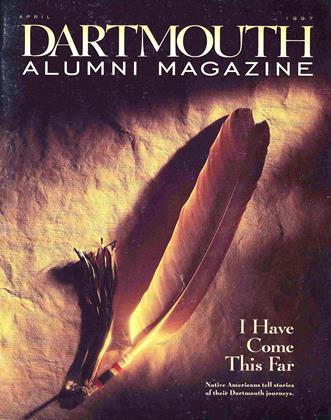He was an un-politician. He was a rebel with a cause. He was a wry commentator on the times, and his remarkable 1992 Presidential campaign, when he defeated Governor Bill Clinton in New Hampshire and then gave him (its up and down the East Coast, was itself a commentary on the times. He told the uncomfortable truth and, until the night he died, people actually listened, evenifitmade them uncomfortable to do so.
Paul Efthemios Psongas '62—swimmer and senator, winner of the New Hampshire primary and loser of the Democratic Presidential nomination, cancer survivor and cancer victim—succumbed January 18, a month short of his 56th birthday. You could call it the Last Hurrumph.
Tsongas was an American original, the son of a Lowell, Massachusetts, dry cleaner, who decided on Dartmouth because he thought it might prepare him to be a chemical engineer. He came to campus skinny and shy. He sure Mas no swimmer; in fact, he was a non-swimmer. But then he met Karl Michael, Dartmouth's legendary swimming coach, and he learned a lesson he never forgot: If you work hard enough you can do anything. You can be elected to the House and then to the Senate. You can beat the Democratic frontrunner, at least for a while. You can get Americans to actually care about the deficit, at least for a while. You can beat cancer, at least for a while.
In his early days in the Senate his colleagues—so many of them so much older, so much less idealistic, so much less willing to go beneath the surface —used to call him "Shirtsleeves Tsongas." He'd sit in the committee chamber, his suit coat draped on the heavy leather chair, his sleeves rolled up. He had come to work, and work is what he did.
He was half a happy warrior. He was a warrior, all right—against poverty and ignorance (as a Peace Corps volunteer), against the conventional wisdom (as a lonely voice for Democratic reform), against the budget deficit (as the Presidential candidate the experts denigrated in 1991), against the simple-minded instincts of our public life (as something of a political philosopher both in and out of office). But he was never particularly happy in his chosen profession of politics.
That's because he was a curmudgeon before his time, and a curmudgeon for all time. He loved the Democratic Party but wasn't unaware of its faults, particularly in the barren years after the death of John Kennedy. He loved Dartmouth College but felt that Dartmouth then was not intellectually rigorous enough. Mostly he loved his family and his Lowell. He never let any of them down, and was an uplifting spirit to them all. Even his hurrumphs were hurrahs.
 View Full Issue
View Full Issue
More From This Issue
-
 Cover Story
Cover StoryI Have Come This Far
April 1997 By Robert A. Bennett '93 -
 Feature
FeatureNative America at Dartmouth
April 1997 By Karen Endicott -
 Cover Story
Cover StoryWhy Don't You Say Anything?"
April 1997 By Davina Begaye Two Bears '90 -
 Cover Story
Cover StoryMy Grub Box
April 1997 By Vivian Johnson '86 -
 Cover Story
Cover StoryI Dance for Me
April 1997 By Elizabeth Carey '93 -
 Cover Story
Cover StoryWe Are Not Your Indians
April 1997 By Arvo Mikkanen '83
David Shribman '76
-
 Article
ArticleSpy in the Cold
October 1975 By DAVID SHRIBMAN '76 -
 Article
ArticleInn Greeters With a Window on the Green
December 1975 By DAVID SHRIBMAN '76 -
 Article
ArticleReagan Revolutionary
DECEMBER 1981 By David Shribman '76 -
 Article
ArticleGod-fearing Surgeon General
APRIL 1982 By David Shribman '76 -
 Books
BooksAdding to the Mosaic
SEPTEMBER 1982 By David Shribman '76 -
 Features
Features“His Life Was a Gift”
NOVEMBER | DECEMBER 2023 By DAVID SHRIBMAN '76







